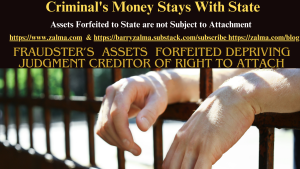Criminal’s Money Stays With State

Post 4790
See the full video at https://youtu.be/lRkLuhZqa8M and at https://rumble.com/v4s9np9-criminals-money-stays-with-state.html
In B.D. v. Sussex County Prosecutor’s Office, No. A-1781-22, Superior Court of New Jersey, Appellate Division (April 19, 2024) the court dealt with the claims of a victim of a sex offender who attempted to get assets of offender that was forfeited to the state.
In this declaratory judgment action, plaintiff, B.D., appealed from the Law Division’s order dismissing his complaint, in which he sought to obtain proceeds forfeited to the Sussex County Prosecutor’s Office (SCPO) in a related health care insurance fraud case.
FACTS
Troy Leonard, an in-home therapist who treated multiple minors, including plaintiff, who had attention-deficit/hyperactivity disorder, autism, and other undiagnosed learning disabilities. Between September 2015 and November 2015, while the SCPO investigated Leonard for allegations of sexual assault of minors, it discovered Leonard committed health care insurance fraud between 2014 and 2015. SCPO investigators uncovered multiple bank accounts containing the proceeds of that fraud and determined Leonard purchased four vehicles between 2014-2015, when the suspected health care fraud claims occurred.
In 2015, the SCPO obtained an order to seize and restrain those bank accounts, which the court granted. Leonard was arrested and charged with multiple counts of sexual abuse of minors, including plaintiff, and thirty-eight counts of second-degree health care claims fraud for allegedly billing insurance companies for services he did not render. Altogether the SCPO seized $610,228.15 and four vehicles.
The court entered a final judgment by default in favor of the State, with title vesting in Sussex County for the property on April 18, 2016.
Leonard pleaded guilty in the criminal matter in May 2016 and entered into a stipulation of settlement pursuant to a plea agreement, agreeing to forfeit the seized property. In 2016 plaintiff’s legal guardians initiated a separate civil action against Leonard seeking civil zdamages stemming from the sexual abuse.
On September 16, 2016, Leonard was convicted of multiple counts of second-degree sexual assault and second-degree health care fraud by a practitioner. Later a final judgment was issued in plaintiff’s favor against Leonard. Plaintiff was awarded $700,000 in compensatory damages and $100,000 in punitive damages.
Plaintiff sued the SCPO for declaratory judgment seeking to satisfy his award from the forfeited proceeds in the amount of the judgment. The trial court concluded plaintiff did not have standing to bring a claim against SCPO for the forfeited proceeds.
DISCUSSION
Plaintiff argued he had standing to bring his declaratory judgment claim against defendant because he had a personal interest in the matter, there is a significant public interest, and there is an actual controversy between the parties.
The appellate division concluded that Plaintiff lacked standing to assert an entitlement to the forfeited proceeds. A plaintiff must have a sufficient stake in the outcome of the litigation, a real adverseness with respect to the subject matter, and there must be a substantial likelihood that the plaintiff will suffer harm in the event of an unfavorable decision. The pivotal question before the Appellate Division was whether plaintiff had an interest sufficient to support this declaratory judgment action.
Since the final judgment of forfeiture severed all property interests Leonard had in the funds held in the bank accounts and cars months before plaintiff obtained a writ of attachment to Leonard’s property on August 5, 2016, and nearly a year before plaintiff obtained the final judgment in the civil action, Leonard had no funds to attach.
A writ reaches only ascertainable property of the defendant in attachment. Here, the proceeds were no longer Leonard’s property when the writ of attachment issued, and later when final judgment was entered. The final judgment of forfeiture eliminated Leonard’s ownership of the money and vehicles
Plaintiff had no right to notice of the forfeiture because the final judgment for forfeiture was issued on April 18, 2016, and plaintiff did not file his complaint until July 7, 2016.
The plaintiff is clearly a victim of Mr. Leonard. He obtained a judgment against Leonard. He could attach any property belonging to Leonard. However, Leonard had no property worth attaching since the state took his property – obtained by fraud – by forfeiture. There is no question that a fraud perpetrator cannot be allowed to profit from his fraud, even if his victims were harmed and should be able to collect a judgment, it can only collect from honestly obtained assets.

(c) 2024 Barry Zalma & ClaimSchool, Inc.
Please tell your friends and colleagues about this blog and the videos and let them subscribe to the blog and the videos.
Subscribe to my substack at https://barryzalma.substack.com/subscribe
Go to X @bzalma; Go to Newsbreak.com https://www.newsbreak.com/@c/1653419?s=01; Go to Barry Zalma videos at Rumble.com at https://rumble.com/c/c-262921; Go to Barry Zalma on YouTube- https://www.youtube.com/channel/UCysiZklEtxZsSF9DfC0Expg.
Go to the Insurance Claims Library – https://lnkd.in/gwEYk.
and at https://youtu.be/lRkLuhZqa8M
Like this:
Loading…







